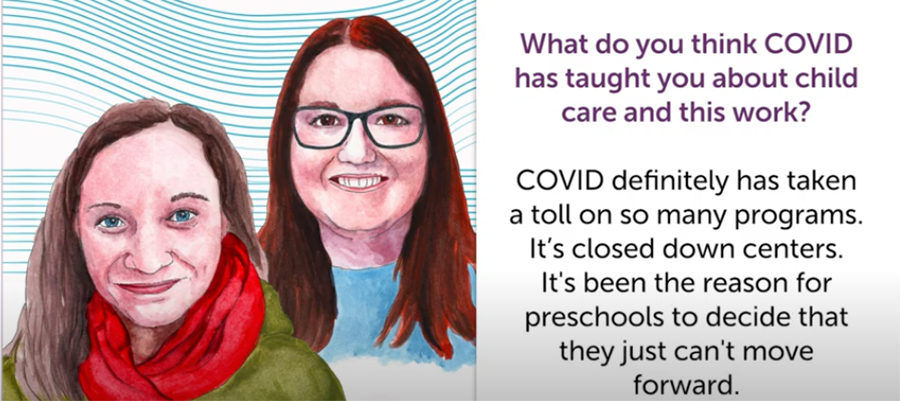
StoryCorps, a national nonprofit whose mission is to record, preserve and share the stories of Americans from all backgrounds, and Child Care Aware® of America (CCAoA) recently partnered on a project to interview child care providers. The providers were asked about their personal journey in the child care field and the impact of COVID-19 on their work and life.
Jennie Dalgas and her colleague Jennifer Mickelson discussed their experiences running and working in child care and education programs. Jennie had to close her center during COVID-19, but taught Jennifer what she knows about running a business; Jennifer’s child care center remained open during COVID-19.
Jennie: What do you think COVID has taught you about child care and this work?
Jennifer: COVID definitely has taken a toll on so many programs. It’s closed down centers. It's been the reason for preschools to decide that they just can't move forward. And yes, there's been a lot of grants that centers are able to receive, but even that only keeps them afloat for so long. Child care is so important—it's needed for families to be able to go back to work to support their families. It's really hard for centers to be able to meet that need given their current circumstances.
Jennie: Yeah, definitely. I think that the hardest part is like, you know, everybody wants to go back to work. Everybody needs to find this new normal. And with fewer programs available—and even the programs that were available before had waitlists—so now what? It's a huge need.
When we look nationwide, over half of the programs are no longer in existence. It's like, okay, that's a big problem. What happened there? We don't value our early childhood families and those little children that don't just need to be somewhere so their parents can go adult. They need to be somewhere where they're being educated and loved. And we should be helping with funding these programs, getting them the resources, getting them the cleaning supplies that really shouldn't be out of pocket. We're getting there, but it's taken this type of an issue to make it so obvious where the pitfalls are. Moving forward, what do programs need to be successful?
Jennifer: We definitely need more funding. Early childhood professionals aren't really treated like professionals so much of the time. There are people that understand that and there are people that value early childhood professionals, but I think we need a bigger understanding of just how important early childhood is. We are teaching them so many life skills that are going to benefit them when they get into kindergarten and all those years later.
Jennie: Five and under is when we're developing all of their basic moral code, their right and wrong, their personality. This is a way bigger job.
Jennifer: One of my biggest goals this year was to create a sense of normalcy for all of these kids because they had been through so much. It's really important to allow them that sense of normalcy, to just come and play, to do art, to have fun with science. I've learned a lot from you and I'm really thankful for that because I've been able to bring so many of those things into my own program.
Jennie: I’m proud of you. For you to be able to take this really important time for those families, including your own, and instill good things into them is so crazy important. I wish there were more programs just like yours all over the country that were able to do that.
The StoryCorps/CCAoA project was made possible with support from the Robert Wood Johnson Foundation.




